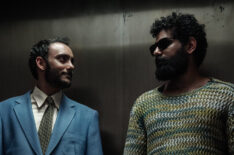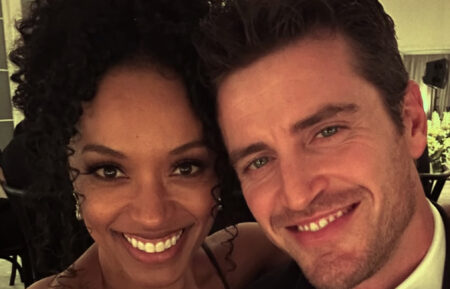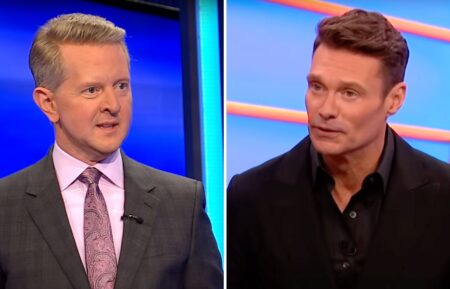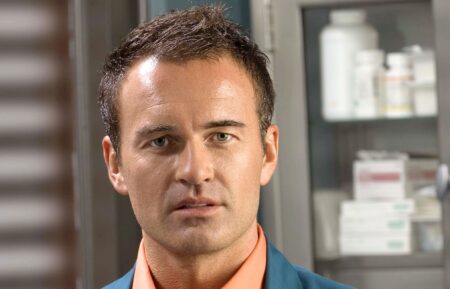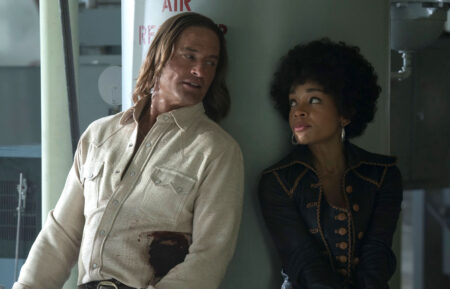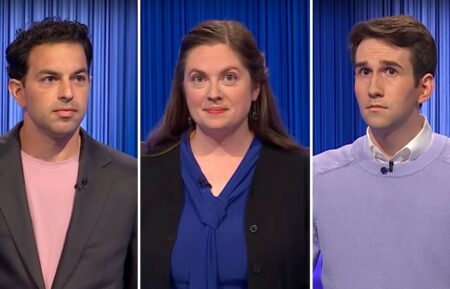‘American Gods’: Pablo Schreiber on Mad Sweeney’s Complex Layers and His Favorite One-Liners
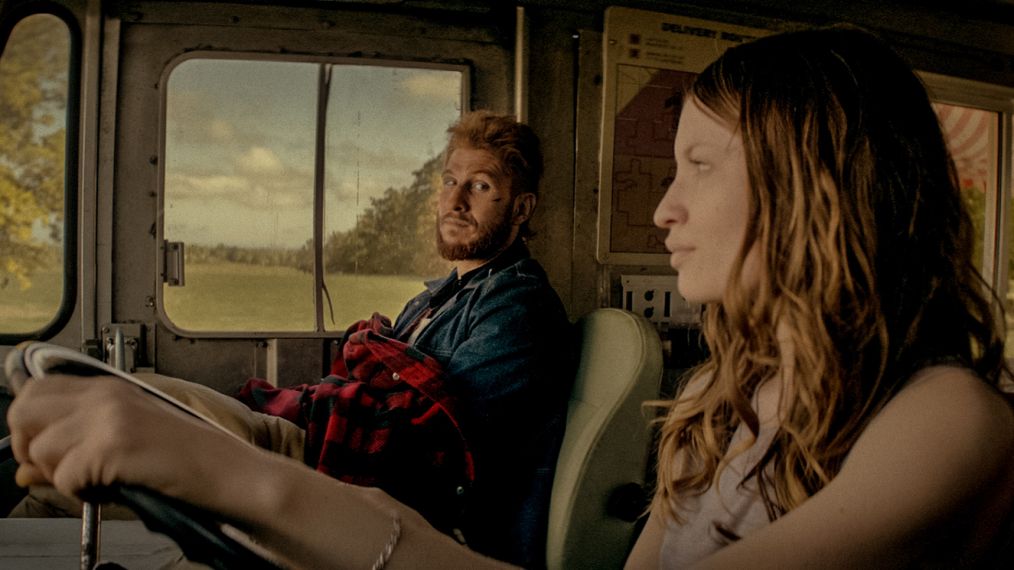
Spoiler Alert
[Spoiler Alert: Only read ahead if you have seen episode 107 of American Gods. Major plot developments discussed below.]
What a fabulous road trip it has been on Starz’s American Gods as Mad Sweeney (Pablo Schreiber), Salim (Omid Abtahi) and “dead wife” Laura Moon (Emily Browning) journey together to the war between the gods, all the while trading vicious barbs and, at least between Sweeney and everyone else, showing a general, very strong distaste for, well, everything.
The show’s penultimate episode before next Sunday’s season finale shed more light on Sweeney’s past, as well as revealed his part in the story of Essie Tregowan (also played by Browning) and (shocker) we now understand what else Sweeney has been even before he was a leprechaun.
With so much goodness coming in this week’s installment of the Neil Gaiman-inspired series, TV Insider grabbed some time for a lengthy chat with Schreiber about what it all means and what we can expect in next week’s finale where we meet Easter, played by Kristin Chenoweth.
We learn a lot more about Sweeney in this episode but safe to say you needed to know a lot of that early on from Bryan and Michael just so you knew who this guy was and how to play him?
Yeah, the specific information that I think was the most important to know early in the season that comes out now wasn’t specifically about knowing who he was or where he came from—although that was somewhat helpful—but it’s to do with finding out that he killed Laura. The guilt that he has for having killed her at Mr. Wednesday’s behest really colors a lot of the early interactions in the season.
It colors specifically the first scene with Shadow and his desire for Shadow to beat him so viciously. He’s really trying to pick a fight and obviously his main intention there is to test Shadow’s medal for Mr. Wednesday to see how he handles himself but there’s also like an emotional element to it where he really wants him to hurt him and he lets him and a lot of that is about the guilt that he’s carrying for what he did to Laura. And then, obviously, all of the interactions with Laura post-episode five when they start their journey together…everything he does in dealing with Laura is colored by the fact that he killed her.
The audience has found out in episode seven but Laura doesn’t know yet [and] until she does, he’s got a secret, basically, from her that he feels awful about and he’s dealing with it. At the same time it’s having a huge distaste for her and all those things or the fact that she’s keeping his coin. That’s the superficial stuff that we see but when people find out that he’s the one who killed her, they will look back on that relationship and understand a little bit more about it and why there seemed to be such a deep emotional connection when they seemingly hated each other so much.
The scenes with Emily have been so much fun to watch. How did you two work together? Did you just follow what’s on the page?
You know, so much of it is on the page, I think. So much of it is just in the setup. When Bryan and Michael came to me and asked me to do the job, their pitch was that this segment of the TV show would be Bonnie and Clyde with a zombie and leprechaun. As hilarious as that sounds, that is the setup. These two people are just so nasty, not just to each other but just in general to the world around them. They’re so kind of ambivalent and nasty and harbor so much anger about how the world works and what it’s come to. And, they take it out on each other. They just lacerate each other and that’s really fun to watch—two people who are just huge a**holes be a**holes to each other.
I think you also feel underneath that they both have this deeply human core and both are harboring a lot of guilt for things that they’ve done. Laura, obviously, for her infidelity to Shadow, and Sweeney for the fact that he killed her and hadn’t wanted to. So, in preparation for it I think so much of it is really in the dynamic and in the free-playing of the situation that they set up for us. In terms of backstory there’s not a lot of a communal backstory to figure out between the two of them because she doesn’t know I killed her so anything that is hampering us or bothering us from either side, it was really for either of us to figure out on our own and then bring into this situation.
We also get the story of Essie Tregowan in the episode and I wanted to be clear about Sweeney’s part in her death. We see him come to her as an old woman when she’s on the porch and the narrator says she dies. Did Sweeney have a hand in that or…?
No, I don’t think he had anything to do with her dying. I think, because he was the god that she kept closest, through her life by giving him these offerings of bread and milk and continuing to worship him, he was the one who was there for her when she did die. She passed peacefully and quietly on her own, fell asleep and never woke up and so that scene that takes place when he comes for her, she’s already dead and he’s just there to usher her to the other side. He’s essentially playing the role of Anubis, what we’ve seen Anubis do with the laying of the heart but I think the idea there is that the god that you keep closest is the one that meets you.
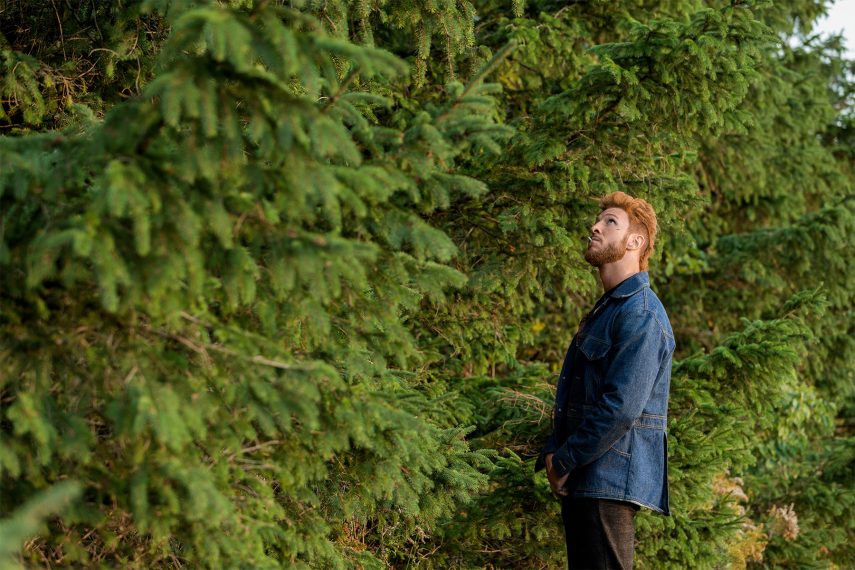
Pablo Schreiber
That makes sense! Also, when Sweeney has the conversation with Laura when they’re driving in the ice cream truck, we find out that Sweeney wants to go to war to die. So he’s preparing for his own death at this point as we’re on the brink of this war, right?
Yeah, so the idea there is that this character is based on an old Irish folk tale of a king who goes mad and he takes his people to war and on the day of the battle he has a vision that he will be killed in battle and he flees and he runs. He spends the next, I think, three or four-hundred years basically in exile. The fable is very out there. He turns into a bird and spends hundreds of years flying around as a naked bird and eventually comes back. Now this is his opportunity to start another war or be a part of another war and to fight honorable and, hopefully, to die in the face of that battle.
I think Sweeney is very disappointed with his lot in life. I think disappointed, even more than his lot in life…what has become important for people. And he doesn’t have much connection to it anymore and the only thing he really feels a connection to is the idea of righting a wrong, so he’s very eager to fight in battle and to go out bravely, basically. And, at the same time he’s pondering the idea of righting this wrong that he’s done to Laura and trying to figure it out
That makes me like him even more that he’s got this badge of honor that he’s trying to fulfill.
I think he’s a very honorable character. All of the bluster and asshole-nish that we see him approach the world with and how much of a surly bastard he can be is, to me, pretty obviously just the wounds that cover a hurt person, you know? And I think it’s relatively obvious by this point in the season that he’s a pretty good dude who’s just covering up his faults with bad behavior.
Sweeney has some of my favorite lines in the show like this episode where he says, “Can’t a man get a moment alone with his prick?” Is there a line that you favor?
I think, “You’re an a**hole, dead wife,” definitely has to be up there. I just love that he addresses her as “dead wife,” so every time he says “dead wife” was another opportunity to have some fun. I would have to say probably the anal sex beach, which is a little bit more than a one liner, but I just loved the construction of that speech. Maybe the best one-liner within that speech is, “That’s some profound knowledge for you wrapped in a quaint sexual metaphor.” I enjoyed that one quite a bit.
Next week is the season finale. How would you describe it?
I haven’t seen the finale, but in terms of reading it, it’s wild, it’s out there. We meet Easter and the whole episode felt to me like it was in technicolor, just like these big bold colors. Obviously, we also have the whole Bilquis (Yetide Badaki) saga, which I think is really full and wonderful. I think the idea that we get to follow a female heroine through that journey—through hundreds of years—is pretty ripe.
And I’ve seen you work in so many different things, whether it’s very mainstream, broadcast network stuff and then something like this. Did you feel challenged differently with this role?
Well, it certainly was a challenge, but every role poses challenges; if they don’t they kind of bore me. The things that I’m the most interested in are the ones that are the hardest to pull off and so there definitely were inherent challenges, just starting from the getting the mix of the Americanized Irish accent right down to the right mix of emotions for the guy and what he was feeling. Getting the look of the character right was something we struggled with for a little while, in the early process. And I would say the fact that it’s so different from other things that I’ve done really fits into the narrative of my career because that’s what I’m looking for when I’m looking for roles really is something that stands out from the other stuff that I’ve done and is as different as possible.
The fact that I’ve gotten to play a character like Pornstache (on Orange is the New Black) and now I get to play a character like Mad Sweeney, I feel really fortunate that I’m presented with opportunities to do things that are so wildly different and so wildly far away from who I am as a person. To me, it’s really kind of the joy of what I get to do is getting to put myself in these kind of wild, out there characters that are so far from who I am.
American Gods, Sundays, 9/8c, Starz

